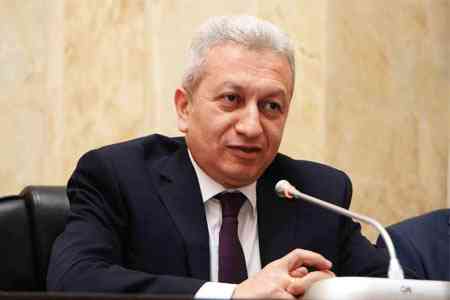


ArmInfo. On June 5, Chairman of the Central Bank of the Republic of Armenia Artur Javadyan presented the conclusions of the Central Bank of the Republic of Armenia on the implementation of the 2019 state budget during a meeting of the Parliament of the Republic of Armenia. First of all, Javadyan emphasized that the implementation of the budget in 2019 contributed to the sustainability of the public debt. In this vein, he said that the ratio of debt to GDP in y-o-y terms decreased by 1.3%, amounting to 50%.
"The reduction in the ratio of debt to GDP was facilitated by the reduction in the budget deficit, which is higher than forecasted for the year, which was due to the improvement in the implementation of state expenditures, including the constant revision of this indicator by the government and in order to increase the efficiency of their implementation," said the head of the Central Bank, noting that tax administration also affected the decrease in public debt. At the same time, he added that in the context of a restraining fiscal policy, the state budget deficit amounted to 41.4 billion drams, or 1% of GDP, which had a restraining effect on gross demand. According to Javadyan, in the context of a restraining fiscal policy, the Central Bank responded to inflationary developments by continuing to pursue a stimulating monetary policy by lowering the refinancing rate twice. Keeping low interest rates, which was accompanied by an increase in lending to the economy, contributed to the growth of gross demand. <As a result of the formation of economic growth in 2019, domestic spending contributed to a greater extent, especially a significant increase in private consumption - by 12.8%>, - said the head of the Central Bank.
At the same time, Javadyan drew attention to the fact that in the context of high economic growth rates and the introduction of amendments to the Tax Code, the government revised the budget program in the direction of growth. As a result, he stressed, revenues to the state budget increased by 16.7%, and in terms of taxes and duties, growth was registered at 16.4%. At the same time, a significant improvement was recorded in terms of the ratio of taxes to GDP - by 1.3%, amounting to 22.3%. Regarding expenses, the head of the Central Bank noted that compared with the previous year, state budget expenditures increased by 12.6%, covering a share of 24.9% in the structure of GDP. The ratio of capital expenditures to GDP, he said, was 2.9%, which still remains below the target in the medium term.
"Based on the abovementioned and understanding the impact of capital expenditures on maintaining GDP growth, it is most important to pay special attention to solving problems in the field and creating solid foundations for increasing capital expenditures," Javadyan stated. Summing up, the Chairman of the Central Bank noted that the changes made in the fiscal policy in 2019, which were mainly reflected in the reduction of the state budget deficit, the reduction of the shadow and the reform of public spending, had a positive effect on maintaining macroeconomic stability and the stability of the public debt.
"Under the conditions of macroeconomic stability, it is very important to ensure the implementation of the necessary capital expenditures to strengthen the foundations in order to ensure stable economic growth," he concluded.